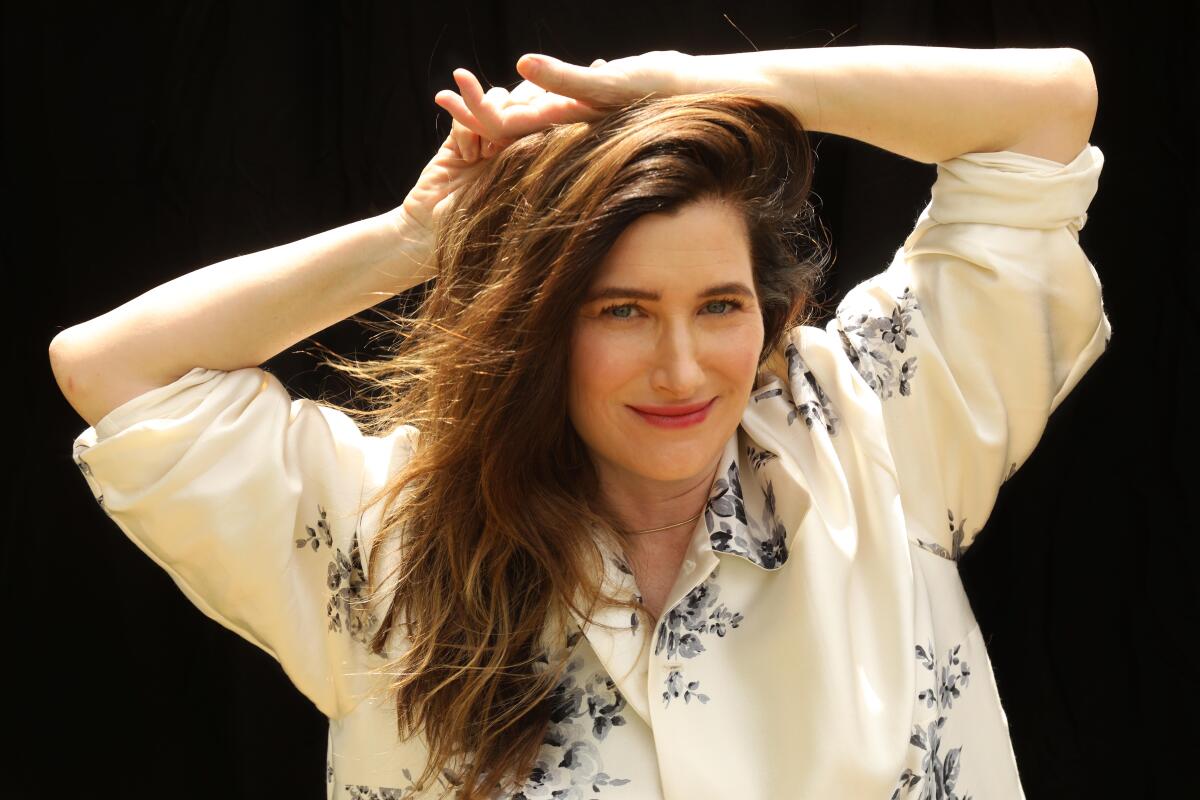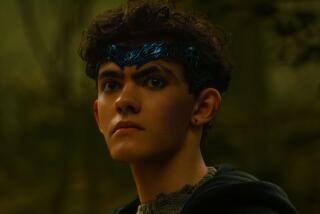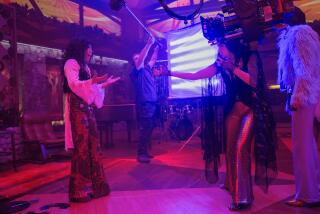How Kathryn Hahn shifted ‘WandaVision’s’ nosy neighbor into raging villain

Kathryn Hahn can’t point to a specific performance that might have won her the role of Agatha Harkness, a villainous witch masquerading as chatterbox housewife Agnes in Disney+’s big-budget limited series “WandaVision.”
“I’ve been around for a while,” is how Hahn’s theory begins. “Maybe they thought there was something about how I’ve been able to slip around different genres.”
Examining Hahn’s resume closely indicates she might be onto something. After all, she upstaged John C. Reilly in the man-child comedy “Step Brothers,” played the gentle rabbi on “Transparent” and spewed good-natured raunch in the “Bad Moms” franchise. Also, Agatha is herself a shape-shifter, decade-jumping in suburbia with superhero Wanda (Elizabeth Olsen) and her android partner, Vision (Paul Bettany).
In Marvel’s “WandaVision,” nothing is as it seems. So we prepared an episode-by-episode guide to the Disney+ series for you to keep handy as you watch.
Hahn, who has so many outsized moments and costume changes in “WandaVision” that they inspired YouTube montages with titles like “20 Times Agatha Harkness Was a Total Icon,” compared the experience to summer stock. “I felt like I was playing an actor in all these different roles,” she says.
Perky, intrusive, perhaps too helpful. What did your research into the nosy sitcom neighbor tell you?
I did a lot of digging, studying the actual sitcoms stylistically and historically. Adjectives like “brassy” are used. Trope-wise, the volume is always turned up.
How does one modulate a big performance? Did director Matt Shakman ever say, “Dial it down”?
Oh, sure. He told me “too much” a lot. [Laughs] It was rarely the opposite. I’m a hambone.
For a Marvel franchise first-timer you’re very adept at energy bolt-throwing choreography.
For a while, I thought I was supposed to figure it out on my own. Then [Elizabeth Olsen] was like, “Talk to my movement coach.” [Jennifer White] is based in the U.K. and was instrumental in helping me find the differences between [Agatha and the Scarlet Witch’s] magic.
Explain. Did you say, “In this scene, I’m hurling exploding purple balls”?
This is just silly actor talk but it’s like the creation of anything. Her movement vocabulary just arose. We wanted to use cauldron imagery [uses her thumb and forefinger to stir a tiny, imaginary pot]. Agatha is a succubus. She just wants power. So there’s a lot of this energy [Hahn stretches out her long fingers, and makes a snatching motion]. For the Scarlet Witch, magic came naturally to her. For Agatha, it was learned.
What’s it like to shoot epic fight scenes while suspended by wires and dressed in flowing witch gear?
When I first came to L.A., I took trapeze. I screamed the whole time — with joy. The first class you’re upside down and grabbing somebody up. So I had that in my pocket. I did the teeniest bit of wire work for a movie called “Tomorrowland.” But this was the most I’ve done. I loved it so much I never wanted to come down.
Quirky indie heartwarmers and a Marvel Cinematic Universe mega-project. Compare and contrast.
Every gig is different. But the scale [on “WandaVision”] was so much more — there was so much mishegoss. Despite that, Matt was able to create this intimate-feeling ensemble. That was unexpected, a real treat for me. I’ll really hold this experience dearly, as something I learned from. What was important to him was to be at the root of a superhero’s origin story about her grief and trauma.
Talk about the mishegoss.
It’s not just me, the boom operator and a camera. There’s a huge screen behind you or a fan the size of a frickin’ SUV blowing your hair back. Agatha’s fake fingernails were so long I couldn’t type on my phone. Someone had to text my kids for me. I was like, “I should be feeling so powerful,” then someone would have to walk me to the bathroom. I’m used to doing it all myself, schlepping my own bags and water bottle with me everywhere. I’m no muss, no fuss. And I had to surrender to the collaboration. So many people went into building this part; that ended up being really moving to me.
Did you know that Agatha would have her own 62-second theme tune written by the composers behind “Frozen”?
I knew from the beginning that I’d have a theme song. What I didn’t know is that I was going to be asked to sing it. I had some experience recording. I wasn’t fearful of singing something that wasn’t in a karaoke room after having a couple. What I didn’t anticipate is that it’d land the way it did.
It was No. 1 on iTunes.
I mean, literally what’s happening? It’s bananas. But it’s real catchy, so I get it.
For a time, you were often cast as the sweet, well-meaning supporting player. What did you love about being the scheming antagonist?
I’m in my mid-40s. What they don’t tell you about this chapter of your life when you’re a kid is that you’ve got some anger. And that we sometimes are unable to express that feeling or have been told that we can’t. After a chapter of being complicated, vulnerable birds that I love so madly there was something very fun about being able to tap into that part of myself.
More to Read
From the Oscars to the Emmys.
Get the Envelope newsletter for exclusive awards season coverage, behind-the-scenes stories from the Envelope podcast and columnist Glenn Whipp’s must-read analysis.
You may occasionally receive promotional content from the Los Angeles Times.









